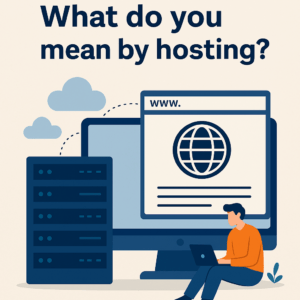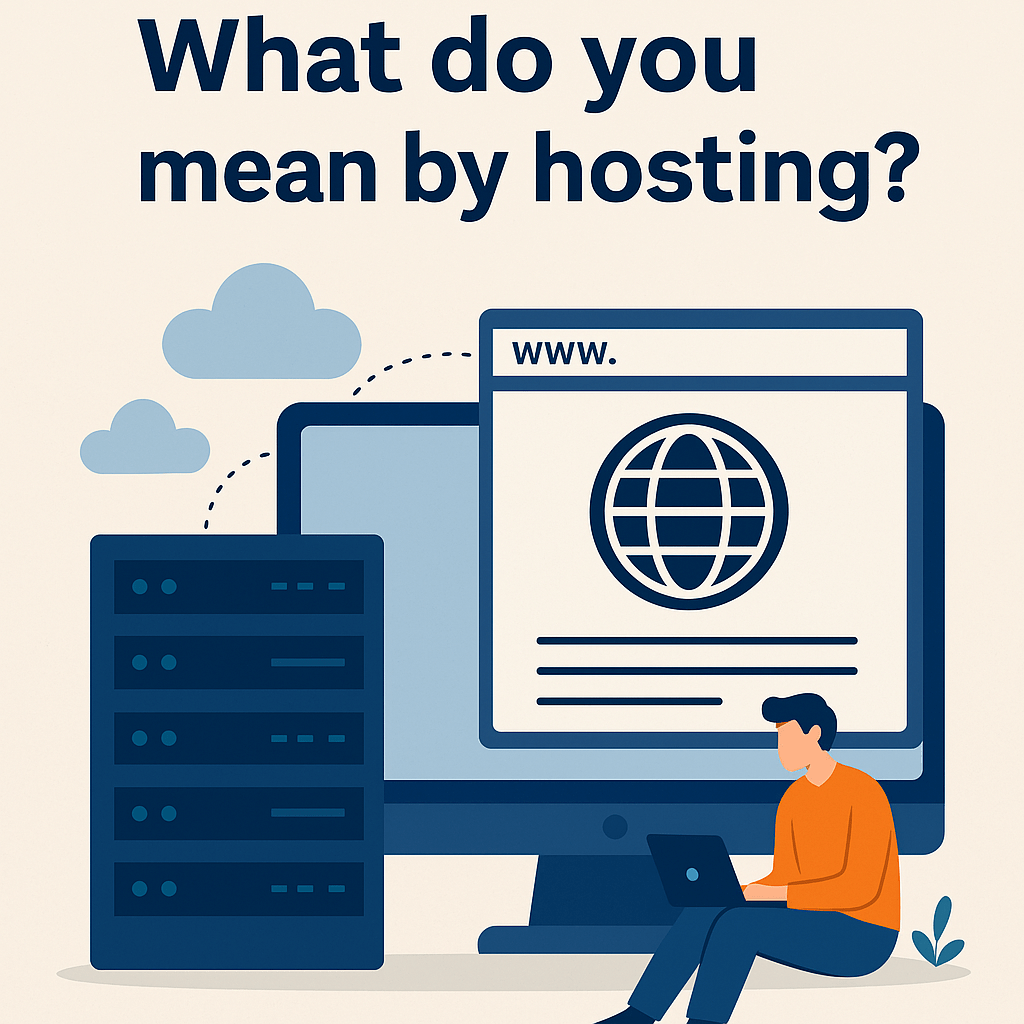What Do You Mean by Hosting? A Beginner-Friendly Guide to Web Hosting Explained
What do you mean by hosting?. Whether you’re setting up your first blog, launching an eCommerce store, or building a full-stack web app, there’s one critical piece that makes your site visible on the internet: hosting. But what do you mean by hosting, exactly?
In this comprehensive guide, we’ll demystify what hosting is, how it works, the different types of web hosting available, and which option might be right for you. Whether you’re a budding developer or someone curious about how websites actually go live, this post is your roadmap.
Understanding Hosting: The Digital Plot of Land
Imagine building a house. You need land to place it on. Similarly, when you create a website, it needs a place to «live» so others can access it online. That place is provided by a web server, and the service that lets you rent that space is called web hosting.
«Hosting is essentially renting space on a server to store your website’s files, so it can be accessed via the internet.»
When someone types your domain name into their browser, it connects to that server, retrieves your site’s files, and displays them on the screen.
What do you mean by hosting? The Hosting Definition: More Than Just Storage
At its core, hosting refers to the process of storing and serving website content—text, images, videos, and code—on a remote server. But modern hosting services go well beyond basic file storage. They also include:
- Security features like SSL certificates and firewalls
- Backups and disaster recovery
- Email hosting
- Scalability for traffic surges
- Technical support and server management
Hosting is the silent backbone of the internet—and the type of hosting you choose can directly impact your site’s performance, reliability, and scalability.
How Hosting Works: A Behind-the-Scenes Peek
Let’s break it down:
- You buy a domain name (like
yourwebsite.com). - You purchase a hosting plan from a provider.
- You upload your website files (HTML, CSS, JS, etc.) to the hosting server.
- The server is always online, waiting for someone to request your site.
- A user enters your domain, which points to the hosting server.
- The server sends the files, and your site is displayed.
This entire process happens in milliseconds, seamlessly connecting people to your content.
Types of Web Hosting: Finding the Right Fit
Different projects require different tools. The same is true for hosting. Here are the most common types:
1. Shared Hosting
Great for beginners and small websites. You share server resources (like memory and bandwidth) with other sites.
Pros: Affordable, easy to set up
Cons: Limited resources, slower speeds during high traffic
2. VPS Hosting (Virtual Private Server)
A step up from shared hosting. Your site shares a server but has dedicated resources.
Pros: Better performance, more control
Cons: Slightly more technical and expensive
3. Dedicated Hosting
Your website lives on its own server. Maximum performance, full control.
Pros: High speed, customization, no resource sharing
Cons: Expensive, requires server management skills
4. Cloud Hosting
Your site is hosted on a cluster of servers. If one server fails, another picks up the slack.
Pros: Scalable, reliable, excellent uptime
Cons: Can be more costly, complexity for beginners
Real-Life Example: Hosting in Action
Let’s say you’re a freelance developer building a portfolio site. You start with shared hosting because it’s cheap and simple. As your traffic grows and you add interactive features, you upgrade to VPS hosting for more speed and control. Eventually, you launch a SaaS product and switch to cloud hosting to scale with your users.
This journey mirrors real-world use cases, and many developers evolve through these stages.
Hosting for Beginners: What to Look For
If you’re new to hosting, prioritize these factors:
- Uptime Guarantee: Aim for 99.9% or better
- Customer Support: 24/7 chat and ticket support is ideal
- Security Features: SSL, malware scanning, DDoS protection
- Scalability: Can your hosting grow with your site?
- Ease of Use: Look for a control panel like cPanel or a custom dashboard
Platforms like Bluehost, SiteGround, and Hostinger cater to beginners with user-friendly dashboards and quick setup tools.
Hosting vs. Domain: What’s the Difference?
Domain = your website’s address
Hosting = where your website files are stored
Think of it like this: Your domain is your street address, and hosting is the house at that address.
Expert Insight: Why Hosting Quality Matters
«Poor hosting can ruin user experience and SEO. Fast-loading, secure websites tend to rank better on Google. Don’t skimp on hosting—it’s your site’s foundation.» — Neil Patel, Digital Marketing Expert
Web hosting isn’t just a tech choice—it’s a business decision. Investing in quality hosting means better performance, happier visitors, and higher search rankings.
The Future of Hosting: Where Are We Headed?
Hosting has evolved dramatically. From physical servers in closets to cloud platforms powered by AI and edge computing, the future is about speed, automation, and resilience.
Expect to see more:
- Serverless hosting models
- Environmentally-friendly (green) data centers
- AI-driven resource optimization
- Tighter integration with CDNs and security layers
Final Thoughts: So, What Do You Mean by Hosting?
By now, the answer should be clear: Hosting is the essential service that powers your website’s presence on the internet. It determines your site’s speed, security, uptime, and scalability.
Whether you’re a startup founder, coding enthusiast, or digital nomad building your brand, understanding web hosting is non-negotiable. Choose wisely, and your site will be fast, reliable, and ready to scale.

FAQs: Real Questions, Real Answers
1. What is web hosting in simple words?
Web hosting is a service that stores your website files and makes them accessible on the internet.
2. Do I need hosting for my website?
Yes, without hosting, your website can’t be accessed online. Think of it as the home for your website.
3. What’s the difference between shared and cloud hosting?
Shared hosting means you share resources on one server. Cloud hosting uses multiple servers for better performance and reliability.
4. Can I host a website for free?
Yes, platforms like GitHub Pages or Netlify offer free hosting for static sites. But for custom domains or dynamic content, paid hosting is usually better.
5. What’s the best hosting for beginners?
Shared hosting with a user-friendly control panel (like Bluehost ) is great for beginners.
6. Is hosting secure?
Good hosting providers include security features, but you should also take measures like enabling SSL and using strong passwords.
If you found this guide helpful, share it with someone launching their first website. Hosting might seem technical, but with the right knowledge, it becomes your most powerful tool.






